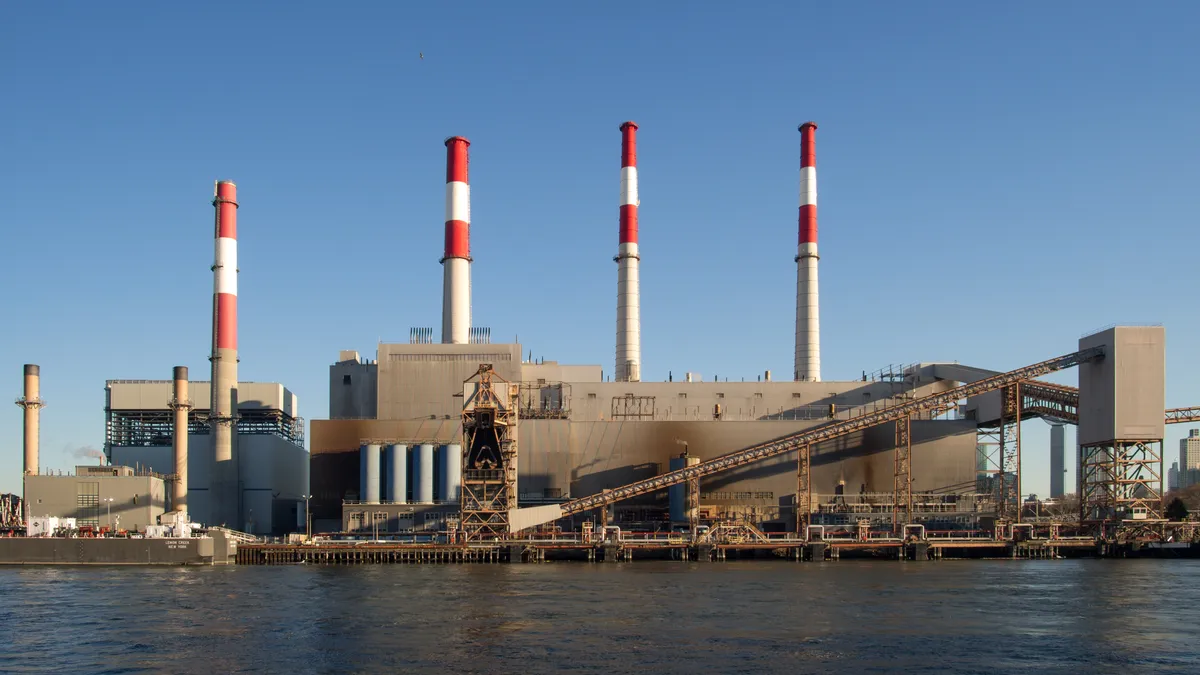Dive Brief:
- Rep. Carolyn Maloney, D-N.Y., on Thursday threw her support behind a proposal to cut the number of peaker power plants in New York City in half by 2025, followed by a complete shutdown in 2030. The fossil fuel plants are designed to provide additional power during times of high demand, such as hot summer days.
- As chairwoman of the House Committee on Oversight and Reform, Maloney's support provided a boost to the Peak Coalition, a group of environmental activist groups in New York that have led the campaign to shut down peaker plants, citing the impact of air pollution on low-income and historically marginalized neighborhoods.
- Maloney also outlined a number of related federal proposals she is backing that would toughen the approval process of new power plants in disadvantaged neighborhoods and provide tax incentives and grants to help retire peaker plants.
Dive Insight:
The Peak Coalition, which is targeting for closure New York City's 19 different peaking power plants, is made up of the New York City Environmental Justice Alliance, New York Lawyers for the Public Interest, UPROSE, The Point CDC and Clean Energy Group.
The coalition in a March 2021 report said it is the first "comprehensive effort" in the U.S. to shut down a city's peaker plants, which it argues have "negative and racially disproportionate health impacts" as demonstrated by higher rates of asthma and other respiratory conditions.
Overall, three quarters of a million people in New York City live within a mile of one of these plants, with about 78% either low income or people of color, the group contends.
"They are old, inefficient, costly and dirty and they are sited in communities that are already dealing with other pollution infrastructure," said Annel Hernandez, associate director of the NYC Environmental Justice Alliance, citing highways and waste transfer stations, among other things, during a panel discussion held Thursday on the issue.
In March, the Peak Coalition released a report laying out a proposal for the shutdown of New York City's 19 peaker power plants, arguing it would be feasible to replace all 89 fossil-fuel powered peaker turbines with a combination of off-shore wind, battery storage, beefed up energy efficiency and solar.
The coalition's report contends such a shift over the next decade is both "technically feasible and cost effective," though it also acknowledges it will require "a new era of alignment, coordination, and shared commitment to a renewable energy framework and policies by public agencies and regulators."
In a press conference Thursday morning in Queens in her home district, Maloney, along with endorsing the shutdown plan, said she also plans to take a look at various renewable power proposals, including converting the Rikers Island jail "into an environmental justice hub" and "building community solar in Sunset Park."
The coalition's report envisions rooftop solar picking up a big part of the slack that would be created by the closure of the fossil-fuel peaker plants, producing 5.6 GW by 2030. That's compared to 3 GW from off-shore wind by the end of the decade and 4.2 GW of eight-hour battery storage.
Maloney said she will also be pushing on the federal legislative front, with the oversight committee working on a proposal to lower the need for peaker power plants by finding ways to lower the strain on the electric grid, a plan she said will include "setting a 100% renewable energy target for the federal government."
Maloney is also backing the Environmental Justice for All Act that would require agencies "to consider the cumulative impacts of pollution in permitting decisions." In particular, this would would force regulators to take a broader look when considering whether to approve a new fossil-fuel power plant in a neighborhood that may already be burdened with other environmental issues, the congresswoman said. In March, she opposed along with Rep. Alexandria Ocasio-Cortez, D-N.Y., plans from NRG to convert an Astoria plant into a natural gas peaker.
Maloney said she is also pushing for the PEAKER Act. The bill, proposed by U.S. Rep. Yvette Clarke, D-N.Y., which would roll out tax incentives and grants to "help retire peaker plants in historically marginalized communities."
However, Ralph Norman, R-S.C., a member of the House Committee on Oversight and Reform, offered a different take, arguing the proposals would end up hurting lower-income residents by hurting the economy and boosting the cost of power.
"The Green New Deal will make living conditions more difficult, particularly for low-income communities," Norman said.













